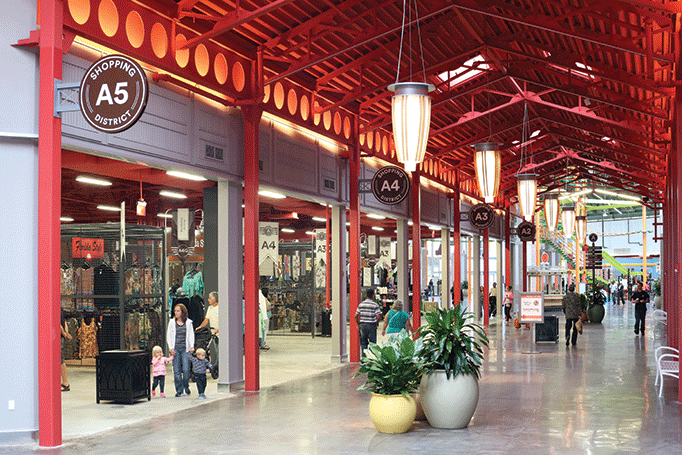
Artegon Marketplace gives the quirky local merchants, artists and crafters that typically pop up at farmers markets and fairs around the country a more permanent home. The 1.1 million-square-foot shopping center, which opened in November and replaced the Festival Bay Mall, is an effort by Artegon Marketplace owner Paragon Outlet Partners to help redefine the traditional Orlando, Fla., shopping experience. To that end, the firm came up with The Village, the artisan marketplace that is at the heart of the retail complex.
This 280,000-square-foot space in the midst of the shopping center comprises nearly 200 artisanal shops offering such merchandise as clothing, jewelry, home decor items, electronics and specialty foods, mostly from Central Florida–based vendors. At the perimeter of the mall are 10 national retailers, including Bass Pro Shops and Fuddruckers.
Baltimore-based Paragon Outlet Partners has developed six outlet centers since the firm’s establishment in 2010, and has three under construction. Artegon Marketplace’s industrial design marks a departure from Orlando’s local vibe, says Thearon Scurlock, the shopping center’s general manager. “There’s really nothing else like it in Orlando,” said Scurlock, explaining that the company eschewed any overdesigned Disneyesque concept in favor of an “urban, clean feel,” using exposed-concrete floors, brick columns and corrugated metal girders.
The Village’s tenant mix reflects the same types of independent merchants that can be found at such singular retail centers as Seattle’s Pike Place Market or New York City’s Chelsea Market. The stores, which measure between 100 and 200 square feet, are intended to offer unique and regional fare. The merchants include Dolce Art Boutique, which sells handmade jewelry and accessories from local artists inspired by the Wayuu people of Venezuela and Colombia; Florida Soap Company, a shop offering handcrafted, vegan and bath-and-body products; and Vagabond Traveler, which sells handmade leather goods.
Artegon Marketplace houses sellers that usually stick to farmers markets and other such seasonal venues, thus giving them “an opportunity for a year-round retail space,” Scurlock said. Village spaces range from $1,200 to $2,300 per month, and retailers that produce merchandise in Florida give the mall a percentage of revenues in lieu of rent. The leases run for six months or 12 months.
The target audience of the center, which is located on International Drive, the area’s main tourist strip, is those 60 million tourists who flock there throughout the year. The idea is to showcase Florida-sourced items and goods, says Scurlock. “We have a lot of artists, unlike a traditional mall,” he said. And that is the whole point, he says. “Our customers are looking for an alternative to the mall — they’ve been to the Gap,” he said. “The malls serve a purpose and always will, but there is a strong movement toward [patronizing] local retailers and handmade offerings.”
The popularity of buying local applies as much to merchandise as to food, Scurlock notes. “People are looking for something that is less commercialized,” he said, “and feels more authentic.”